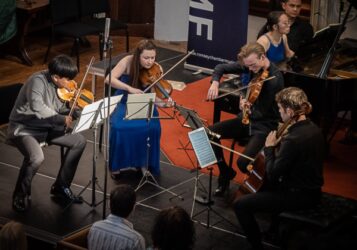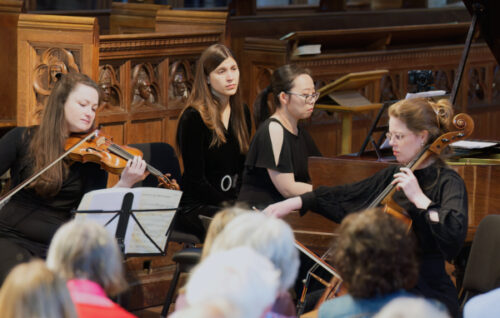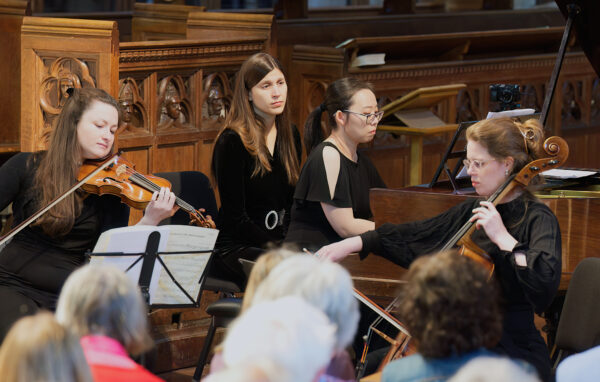
 United Kingdom Various, Romsey Chamber Music Festival 2023: Laura Rickard, Luke Hsu, Emma Roijackers (violin), Coby Mendez, Sofia Silva Sousa, Sào Soulez Larivière (viola), Rainer Crosett, Lydia Hillerudh (cello), Sergio Bucheli (lute), Ziteng Fan (piano), Ensemble Renard (Ellie Blamires [flute], Francesca Cox [oboe], Holly Isherwood [clarinet], Patrick Bolton [bassoon], George Strivens [horn]). Romsey Abbey, Romsey United Reformed Church, Romsey Town Hall 30.5 – 4.6.2023. (CK)
United Kingdom Various, Romsey Chamber Music Festival 2023: Laura Rickard, Luke Hsu, Emma Roijackers (violin), Coby Mendez, Sofia Silva Sousa, Sào Soulez Larivière (viola), Rainer Crosett, Lydia Hillerudh (cello), Sergio Bucheli (lute), Ziteng Fan (piano), Ensemble Renard (Ellie Blamires [flute], Francesca Cox [oboe], Holly Isherwood [clarinet], Patrick Bolton [bassoon], George Strivens [horn]). Romsey Abbey, Romsey United Reformed Church, Romsey Town Hall 30.5 – 4.6.2023. (CK)

The music-loving citizens of Romsey know when they are on to a good thing. They have been turning out consistently and in force during the Chamber Music Festival – the fifth, under the artistic direction of its founder and prime mover, violinist Laura Rickard. What Laura has achieved here is something remarkable: and in order to do justice to it I shall have to leave the music itself on one side for a paragraph or two.
Laura knows that music is – or should be – about building communities. Firstly, among the performers: the players she gathered for this Festival – all young, all phenomenally gifted – operated as a multinational team. At the end of every piece they acknowledged each other with a smile and a hug as they lined up to take their bow. Those who were not playing listened to and supported those who were; at the end of Luke Hsu’s marathon performance of the week’s toughest nut – Bartók’s almost half-hour long Sonata for Solo Violin – they were all on their feet at the back of the hall. After the performance of Brahms’s F minor Piano Quintet at the end of the Festival Finale, they all returned to the stage once more to play Elgar’s Salut d’Amour together. Nothing could have been more fitting.
I don’t think I have ever been to a musical event of this kind where the musicians have worked harder, through highly engaging spoken introductions, to draw their audience in to share their perception and enjoyment of the pieces they are about to play. There was no spokesperson: they all did it. It is particularly important where the music is unfamiliar, as much of this was. Their passion and their enthusiasm were infectious, their inside knowledge of the music often revelatory; they were entertaining, natural, never talking down to us. Thinking again of Luke’s Bartók, I was going to say that his introduction was a performance in itself: but that makes it sound artificial, whereas in reality it was genuine and deeply felt, designed to help us find our way through a dauntingly dark piece – not an easy listen (and, I imagine, fiendish to play).
When you have built your local community – a loyal audience that will trust you in your choices of repertoire – you can take risks. A Festival like this can provide ideal conditions for hearing unfamiliar music, opening windows onto unknown musical landscapes, and revealing sometimes surprising connections between different composers. Of the thirty-odd pieces I heard during the five days of the Festival, I was previously familiar with only three. What an opportunity, then, for me!
Laura had chosen to theme the Festival around the Belgian violinist and composer Eugène Ysaÿe, revered as a teacher and performer, the man who (in Roger Nichols’s words) ‘took violin playing into the twentieth century’. Laura’s starting-point was this year’s centenary of Ysaÿe’s influential solo violin sonatas; so it was appropriate that the Festival began with the fourth of them, played with crystal clarity by Emma Roijackers in the wonderful setting of Romsey Abbey, moving from a homage to Baroque dance forms to a more open, modern style. The centrepiece and musical highlight of this opening concert was Rainer Crosett and Ziteng Fan’s performance of Debussy’s Cello Sonata; it was preceded by the version for piano trio of D’un matin de printemps by Lili Boulanger, tragically short-lived, whose remarkable music is finally gaining some traction with concert audiences. Ziteng was joined by Laura (violin) and Lydia Hillerudh (cello). The concert ended with two pieces in which Laura had invited local young string players to join her and Luke; it was a wonderful idea – the augmented body of strings made a gorgeously full sound in the spaces of the Abbey. Laura herself led them in a Sarabande by Saint-Saëns – her ecstatic solo on a cushion of strings sounding almost like a Gallic Lark Ascending – and Luke provided the fireworks in Kreisler’s witty Præludium and Allegro (in the style of Pugnani): a nice touch, since Ysaÿe alluded to this piece in the finale of the solo violin sonata with which the concert opened.
Another of Ysaÿe’s solo violin sonatas featured in the Open Masterclass, which I couldn’t attend; but the next concert opened with a piece of his that provided the Festival’s highly appropriate title – Amitié, played by Emma and Laura (violins) and Ziteng (piano). There was gorgeous cantabile writing for the two violins, alongside more agitated passages that suggested that friendship is not always plain sailing. The beautiful close was left to the piano.
Ziteng was joined by the Portuguese violist Sofia Silva Sousa for a Sonata for Viola and Piano by Henri Vieuxtemps – a nineteenth-century virtuoso in the Paganini mould who was apparently also a skilled viola player. It began low in the viola’s compass, with gorgeous woody tone from Sofia; the conclusion was lovely too, but overall I found it less musically compelling than Amitié; I found myself listening to the more interesting (and taxing) piano part. The central Barcarolla was atmospheric, and Sofia was well up to the pyrotechnics in the finale. Ziteng and Sofia were then joined by Emma, Laura (violin) and Lydia (cello) for Elgar’s late Piano Quintet, given a performance of real intensity.
The young wind quintet Ensemble Renard dropped in on their way to the Aldeburgh Festival with a crisp, palate-cleansing lunchtime concert: a divinely airy arrangement of Ravel’s Le Tombeau de Couperin, the concluding Rigaudon taken daringly fast; the entertaining Wind Quintet No.1 by Jean Françaix, who on this showing sounds like a seventh member of Les Six; between them, a real discovery – a Trio for Flute, Clarinet and Bassoon by Rosy Wertheim, a Dutch composer whose family suffered in the Holocaust. Written in 1942, the Trio betrays few signs of its times, though the bleak lyricism of its Adagio called to mind the desolate woodwind solos that follow catastrophe in some Shostakovich symphonies. The Ensemble’s encore – an arrangement of the opening of Kinderszenen – was an oddity: Robert Schumann’s dreaming is best left to the piano.
The next concert featured two violin high wire acts: I have already mentioned Luke’s spellbinding performance of the Bartók Sonata for Solo Violin which really deserves a notice of its own, which space here forbids. Emma, partnered on the piano by Ziteng, tackled Ravel’s famous Tzigane – and triumphed: she met all its fiendish technical challenges with breathtaking aplomb, and the ending was just wild. When a violinist says that this is one of her favourite pieces, you know she’s good.
Between Ravel and Bartók came Enescu: his eloquent, folk-inspired Concertstück for Viola and Piano. We hear too little of this Romanian composer’s music: Sào Soulez Larivière, with Ziteng on piano, treated us to a gorgeously lyrical performance with a stormy central section. The concert had opened in fine style with a winning performance by the Mila Piano Trio (Laura, Lydia and Ziteng) of Haydn’s Piano Trio No.44 in E major: a performance to put paid to the idea that Haydn’s music, for all its wit and grace, lacks depth and drama.
There was a morning Family Concert, which I didn’t get to, but I heard that plenty of children had come along to enjoy it. That afternoon Luke was in action again with another of Ysaÿe’s Solo Violin Sonatas, No.5. The opening movement is a beautiful evocation of dawn, with a mix of legato and pizzicato, atmospheric rustlings, glintings and quiverings of life: almost impressionistic. The following Danse Rustique was earthy and attractive: Luke dispatched it with agility, whimsy and a whirlwind finish.
Adrian Sutton’s Trio Dances, as performed by Emma (violin), Sofia (viola) and Lydia (cello), proved to be a more than welcome British guest at this French feast. Modelled on Renaissance dances, which Sutton plainly loves, they instantly caught the ear: a lovely, sometimes boisterous Galliard, very English, with some touches that brought Tippett to mind; a Sarabande whose sensitive tapestry of sound made me think of Finzi, with a lovely cello solo against gentle rocking in the violin and viola; and a bouncy Rigaudon, the theme tossed between the instruments, with a little astringency thrown in. It was a tour de force, and the audience (including me) loved it.
Just as welcome was the return of Jean Françaix: Luke, Sofia and Lydia shone in his String Trio, written when he was 21, and as cheeky as anything his English contemporary Walton was turning out at that age. Typical French insouciance to use the hallowed musical formula B-A-C-H – backwards. There was biting irony, playful and acerbic – music with a cutting edge; yet the Andante, a gentle Berceuse, might rock a listener to sleep. I cannot do better than Luke’s description of the finale, which ‘shows the middle finger to all the Fascist movements in the 1930’s’; the music struts ridiculously, eventually achieving a mock maestoso, only to have all the air let out of it.

Laura had bravely chosen the lesser-known Fauré Piano Quartet, the Second, to end the concert. It was performed by Ziteng (piano), Laura (violin), Sào (viola) and Rainer (cello). I have a densely and enthusiastically written page of detailed notes on their performance: I won’t subject you, gentle reader, to a reproduction of them, but please take it from me: it was glorious. And I do not say that lightly.
In the interval of this concert I heard a lady gasp wonderingly: ‘What technique there is on display!’ Amen to that!
Later on we were treated to a Tango Evening, the players adopting an authentically raw, abrasive style of playing: Piazzolla, of course, and Jacob Gade’s famous tango Jalousie (Laura producing a dramatically Latin fullness of tone). Also Jessie Montgomery’s Strum, and an Andante by Rodrigo – gently lyrical, as we might expect, with a delightful quick section that made me think of Klee’s Twittering Machine. And – surprise, surprise – Ysaÿe put in an appearance too: his Paganini Variations, on the well-known tune that so many composers have had a go at. Ysaÿe’s contribution was both impressive and entertaining: there was a sense that in each variation a musical style was being affectionately parodied.
Lunchtime on Sunday brought another treat, in the magnificent setting of Romsey Town Hall: a recital by the young Mexican lutenist Sergio Bucheli. He transported us to another world, in his playing and also with his words: his manner when talking to us easy, his absorption in the music absolute. He began with a Suite by Gaultier, one of a group of French lutenists using the style brisé, who inspired Couperin, who inspired Bach: these were some of the first pieces of dance music – later so popular – to be written. He played them on a replica of a Parisian lute which was used to lull Louis XIV to sleep: I don’t suppose I was the only member of the audience charmed by the idea of having one’s personal lutenist for this purpose.
Bucheli switched to a different lute – Italian, with a long extension like a theorbo or archlute – for a set of pieces by Dowland, lachrymose meditations giving way to lively dances (How could Lady Hunsdon’s Puffe be anything else?). Then back to the French lute for Bach’s Cello Suite No.1: a quite different sonic experience from hearing it on the instrument it was written for (Bach did provide a precedent by transcribing another of the Suites for the lute). Bucheli’s playing was thoughtful, gently accentuating the improvisatory quality of the instrument: unhurried, rhythmically fluid, hypnotically beautiful. The elegant, well-proportioned venue all seemed a perfect acoustic space for the soft yet penetrating sonority of the lute. Bucheli himself professed delight at the opportunity to play solo – he spends most of his time playing in operas or accompanying singers – and we were all delighted when he obliged us as an encore with ‘another gorgeous Sarabande’.
And so to the finale. Having heard a short piece by Lili Boulanger in the first concert, it was good to hear something from her sister Nadia – much better known, though not as a composer. Her Three Pieces for Cello and Piano, elegantly performed by Lydia and Ziteng, were suave, delicate, lyrical: the third one vigorous, with a middle section like an ocean swell. And then Ysaÿe: the larger of his two string quintets, the manuscripts of which have languished for a century in the Belgian National Library; some of these players were involved in the creation of a performing edition of the B minor Quintet, and Lydia told us that this performance might be its UK premiere.
So was it all worth it? Yes, and again, yes. Ysaÿe’s music casts a spell of its own: it doesn’t sound like anyone else’s. There are certainly suggestions that he admired Tristan und Isolde; even a hint or two that we were only a cello short of the strings needed for Verklärte Nacht. But the piece does not have a German sound; it is nothing like the Brahms that was to follow. Ysaÿe gives his two violas some gorgeous music to play; there is excitement too – once or twice I thought Luke was going to jump out of his chair. He and Emma played violin, Sofia and Sào viola, and Lydia cello. A lovely piece, and a magnificent performance: for me, a highlight of the Festival.
The Brahms Piano Quintet in F minor was given a magnificent performance too, wonderfully sonorous, flexible and expressive. Laura had drawn our attention to the influence of Schubert, particularly his great String Quintet, on the first three movements. The Andante, borne along on a gentle rocking rhythm, gave way to a full-hearted Scherzo; the tonal ambiguities of the Finale looked to the future. The indefatigable Ziteng (piano), Luke and Laura (violin), Sào (viola) and Rainer (cello) played it for all it was worth, with energy and passion: a wonderful way to end the Festival.
Two final bouquets. One to the charming Coby Mendez, violist, guitarist, page-turner, platform arranger, front-of-house assistant: he was always busy, and always delightful. And one more to Laura, for her excellent notes on the music: full of fascinating information, detailed but not too technical, sparkling with a sense of what it is about the music that excites her. I for one will be keeping my programme book, and I have no doubt that from time to time I will refer to it. And not only for Ysaÿe.
Chris Kettle
